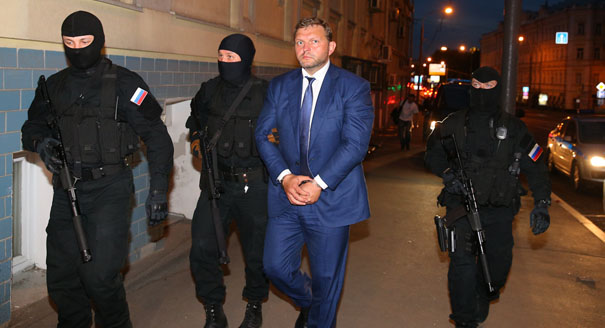When news of the governor’s arrest on suspicion of bribery first hit the Internet, sparking discussions of whether the case is political, the Investigative Committee promptly published a set of photographs. A disoriented Belykh is seen sitting in a dimly lit restaurant—a bottle of wine, a glass, and rows of euro bundles on the table in front of him. This “enemy of the people” was not even patriotic enough to take his bribe in rubles. The second photo leaves no doubt: the governor—his face distorted under the glare of the UV light used to check the bills—has his hands on the money. The photos were followed with a video: a dejected Belykh being escorted to the Investigative Committee. Russia’s law enforcement officials were all but live-streaming a reality show.
In the same way that Belykh has been arrested just as the campaigns for the September parliamentary elections are about to kick off, the detentions of other Russian officials have been in sync with the political calendar in recent years. Sakhalin region governor Alexander Khoroshavin was detained in the spring of 2015, right before the campaign rolled out for the gubernatorial and regional legislative elections. The details of the investigation were also widely covered in the media: searches yielding piles of cash and a diamond-encrusted gold fountain pen, a Lexus gifted to a call girl. The Khoroshavin case was timed just right: early enough to give his successor Oleg Kozhemyako a chance to prepare for the elections, but late enough that the effect of the controversial arrest and the “gold pen” did not wear off before the campaign.
The next major gubernatorial affair—that of Komi Republic governor Vyacheslav Gaizer—was also timely: it occurred the following September right after the region’s parliamentary election, allowing Gaizer’s team to first get the necessary results. Had the process begun at the height of the campaign, elections in the region would have failed, if only because the governor headed United Russia’s party list.
Gaizer and Khoroshavin were members of the ruling United Russia party, but they were not just cogs in a machine. They had decided to take control of their resource-rich regions without toeing Moscow’s line. Mayor of Vladivostok Igor Pushkarev was also arrested recently. He had been vying for power in Primorsky region, putting forward his own candidates from opposition parties.
Investigative Committee spokesman Vladimir Markin had forecast that there would be a new victim on the eve of the Duma elections, and he is already billing Belykh’s arrest as part of the grand and constant fight against corruption waged by the authorities.
Yet Belykh’s detention differs from others in that he is very far away from major political players and was a representative of the liberals in government. If any other governor had been detained, then the party that he belonged to or sympathized with would face problems in the upcoming elections. The heads of almost all regions (with the exception of Orel and Irkutsk oblasts, which are governed by Communists) are members of, or had been nominated by, United Russia. The case against Nikita Belykh will have virtually no effect on the party of power’s performance in Kirov region, or perhaps it will even have a positive effect.
If the opening sequence of the arrest is anything to go by, the actual investigation into Belykh will also be very public. The governor will be reminded that he used to head the Union of Right Forces, and that his erstwhile boss, former Perm region governor Oleg Chirkunov, now lives in France; that he has employed as an advisor opposition activist Alexei Navalny, who was convicted by a Kirov court for abuse of power; and that Maria Gaidar, once a deputy governor of Kirov region, has absconded to Ukraine to work for Odessa region governor Mikheil Saakashvili. Belykh has never tried to pose as an ascetic; he vacationed in the West and did not eschew meetings with diplomats. State television correspondents will not have to dig deep to find incriminating information. The TV clips will end with shots of the governor behind bars: the wicked are punished.
So, the media will scrutinize every detail, and politicians from all parties—United Russia, the Communist Party, Just Russia, the Liberal Democratic Party—will make digs at Belykh. Fellow opposition politicians are already ridiculing him for his past statements about honesty and fighting corruption.
There were virtually no directly elected (and thus well-known) governors that the Kremlin could afford to sacrifice, nor mayors. Belykh was the obvious choice and the inner circle in the Kremlin has long preferred the most direct and crude, but foolproof, methods. The arrest of the Kirov region governor has proved itself to be just that: everyone is now criticizing him in unison.



